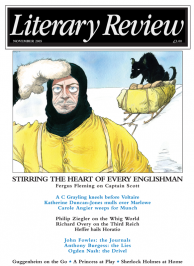Michael Fishwick
Whither The Wilderness?
Fencing Paradise: Reflections on the Myths of Eden
By Richard Mabey
Eden Project Books 229pp £15.99
This is a curious book. Its subtitle suggests that we are in for a bit of rumination, and we get plenty, but as I read I found myself increasingly perplexed, wondering if Richard Mabey had quite decided what the book was supposed to be.
The facts are simple enough: visionary Dutchman Tim Smit, who reclaimed the skeletal remains of the gardens at Heligan in Cornwall from decades of neglect and brought a horticultural past to life, created transparent biomes, seemingly made out of giant sheets of bubble wrap, in a disused quarry not far away to house collections of plants and trees from around the globe, and made it into one of the must-see attractions of south-west England; 1.4 million people visit it each year.
Richard Mabey is a distinguished and much-loved nature writer. But Fencing Paradise is frustrating for its peripatetic approach to its subject, as if the book were a sort of potted ‘Further Reading’ for those who have viewed the site and want to cogitate a little more deeply on its meaning.

Sign Up to our newsletter
Receive free articles, highlights from the archive, news, details of prizes, and much more.@Lit_Review
Follow Literary Review on Twitter
Twitter Feed
Under its longest-serving editor, Graydon Carter, Vanity Fair was that rare thing – a New York society magazine that published serious journalism.
@PeterPeteryork looks at what Carter got right.
Peter York - Deluxe Editions
Peter York: Deluxe Editions - When the Going Was Good: An Editor’s Adventures During the Last Golden Age of Magazines by Graydon Carter
literaryreview.co.uk
Henry James returned to America in 1904 with three objectives: to see his brother William, to deliver a series of lectures on Balzac, and to gather material for a pair of books about modern America.
Peter Rose follows James out west.
Peter Rose - The Restless Analyst
Peter Rose: The Restless Analyst - Henry James Comes Home: Rediscovering America in the Gilded Age by Peter Brooks...
literaryreview.co.uk
Vladimir Putin served his apprenticeship in the KGB toward the end of the Cold War, a period during which Western societies were infiltrated by so-called 'illegals'.
Piers Brendon examines how the culture of Soviet spycraft shaped his thinking.
Piers Brendon - Tinker, Tailor, Sleeper, Troll
Piers Brendon: Tinker, Tailor, Sleeper, Troll - The Illegals: Russia’s Most Audacious Spies and the Plot to Infiltrate the West by Shaun Walker
literaryreview.co.uk